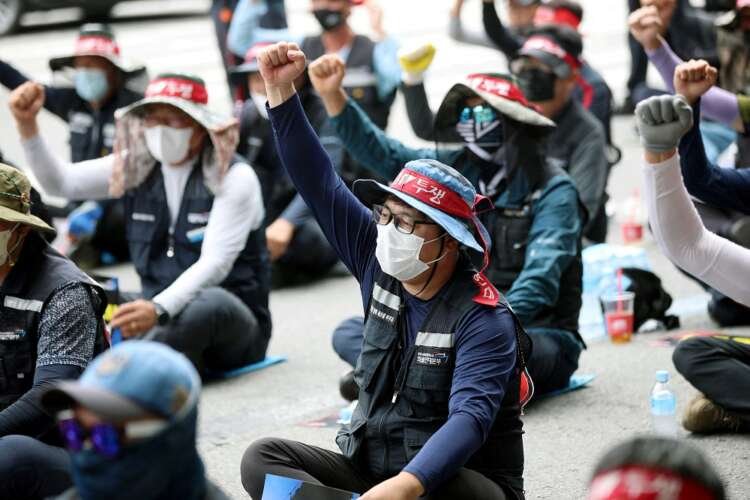Factbox-Impact of strike by South Korean truckers on autos, steel, others


(Reuters) -Thousands of South Korean truckers were on strike for the seventh day on Monday, protesting over pay as
(Reuters) -Thousands of South Korean truckers were on strike for the seventh day on Monday, protesting over pay as fuel costs surge, disrupting production, slowing port operations and posing new risks to a strained global supply chain.
South Korean industries, including auto, steel, petrochemical and cement, faced accumulated losses worth about 1.6 trillion won ($1.2 billion) as of Sunday due to the ongoing trucker strike, the industry ministry said.
Following are details of the disruption, lost production and reactions from union officials and businesses.
AUTOS
The trucker strike had cost the South Korean auto industry about 5,400 vehicles in lost production, worth about 257 billion won as of Sunday, according to the industry ministry.
Hyundai’s Ulsan factories makes about 6,000 vehicles daily, the union said. The strike had cost the automaker more than 3,800 vehicles as of Friday – worth up to 120 billion won, according to the company’s union.
Some employees at Hyundai Motor and affiliate Kia Corp were using newly assembled cars to make deliveries, customers told Reuters. Hyundai Motor Group’s spokesperson was not immediately available for comment.
Hankook Tire & Technology Co Ltd, supplier to major automakers such as Volkswagen AG and Mercedes-Benz Group AG, has seen daily shipments fall by about 50%, a spokesperson said.
The industry ministry estimated that about 640,000 tires worth about 57 billion won had faced shipping issues as of Sunday.
BATTERIES
One battery maker made shipments before the strike as a precaution, said an official at the maker who declined to be identified. The firm did not experience disruptions last week but will reassess its handling of shipments if the strike continued, the official said.
LG Energy Solution Ltd, SK Innovation Co Ltd’s battery unit SK On and Samsung SDI Co Ltd together command more than one-fourth of the global electric vehicle battery market.
SEMICONDUCTORS
The truckers plan to stop shipments of raw materials for semiconductors produced in Ulsan, said union official Park Jeong-tae.
Samsung Electronics Co Ltd and SK Hynix Inc, two of the world’s biggest memory chip makers, declined to comment.
One major tech manufacturer does not expect near-term disruptions given its inventories of raw materials, said an official at the manufacturer on condition of anonymity.
CEMENT, STEEL
Steelmaker POSCO said it halted work at some plants on Monday due to a lack of space to store unshipped products.
About 450,000 tonnes of steel products worth about 698 billion won have faced transport issues due to the strike.
The Korea Cement Association estimated daily revenue losses of about 15 billion won for the cement industry since the strike began last Tuesday.
The industry ministry estimated that the strike had cost cement companies about 75 billion won as of Sunday.
REFINERS, PETROCHEMICALS
S.Korea’s average daily shipments of about 74,000 metric tonnes of petrochemical products have been slashed by 90% since the strike, the Korea Petrochemical Industry Association said.
The strike had cost the country’s petrochemical sector about 500 billion won as of Friday, according to the industry ministry.
South Korea has the world’s fifth-largest refining capacity.
HITE JINRO
Police have made more than two dozen arrests including members of the truckers union for blocking the HiteJinro Co Ltd brewery in Icheon, Yonhap news reported.
A HiteJinro spokesperson declined comment on the arrests, but confirmed that members of the truckers union were blocking entry to both its Icheon and Cheongju breweries, cutting shipments by about 40% as of Sunday.
PORTS AND CONTAINERS
Busan Port, the world’s seventh-biggest container port, said the strike had cut its container traffic by two-thirds.
Container storage sites are filling up and authorities are discussing measures to secure more, a government official said.
The movement of containers at Ulsan port, which accounts for about 10% of South Korea’s port traffic, has been suspended since Tuesday, a government official said.
($1 = 1,286.6200 won)
(Reporting by Seoul bureau; Editing by Christopher Cushing and Stephen Coates)
The automotive industry encompasses all companies and organizations involved in the design, development, manufacturing, marketing, and selling of motor vehicles. It includes automakers, suppliers, and service providers.
Financial stability refers to a condition where the financial system operates effectively, allowing for the smooth functioning of markets, the efficient allocation of resources, and the management of risks without significant disruptions.
The petrochemical sector involves the production of chemicals derived from petroleum and natural gas. These chemicals are used in a wide range of products, including plastics, fertilizers, and pharmaceuticals.
Explore more articles in the Top Stories category











